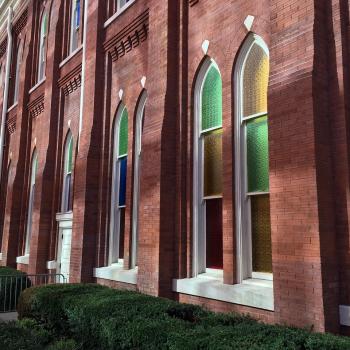Should we not therefore call the Pope a Christian chauvinist religious leader? Yet Hindus who are more tolerant than this may be designated in such a manner. Hindus are not only not chauvinistic, they are generally suffering from a lack of self-esteem and an inferiority complex by which they are afraid to really express themselves or their religion.
They have been beaten down by centuries of foreign rule and ongoing attempts to convert them. The British treated them as racially inferior and both Christians and Muslims treated them as religiously perverted. That some Hindus may express pride in their religion is a good sign and shows a Hindu awakening. Unfortunately the groups who may be challenged by this awakening have labeled this pride chauvinistic.
Naturally some Hindu groups may express this pride in an excessive way, just as happened with the Black pride idea in America during the civil rights movement, but this is only an attempt to counter a lack of pride and self-respect; it is hardly the assertion of any enduring cultural militancy and does not have a history like the fundamentalism of Christianity and Islam, which goes back to the early eras of these faiths.
Such terms as "fundamentalist" and "chauvinist" are much less applicable to Hinduism than to other religions and generally a great exaggeration. They are a form of name-calling, and do not represent any clearly thought out understanding. It is also interesting to note that many of the people who brand Hindus in this light are often themselves members of more exclusivist ideologies, which have an agenda to gain world-domination and to take over India.
This does not mean that Hindus should not be criticized. Certainly they can be criticized for many things. They have to really look at who they are and what they are doing, because in most cases they are not living up to their inner potential or their heritage. On a social level many Hindus are trapped in backward social customs, but those who are not backward are usually caught in the corruption or materialism of modern society.
On an inner level Hindus suffer from lack of creativity, initiative, and original thinking. They want to imitate either their own older thinkers, whose teachings may not be entirely relevant today, or, if modern, they imitate the trends of Western culture, which are unspiritual.
As a group Hindus mainly suffer from passivity, disunity, and a lack of organization, and they are very poor at communicating. Their main problem is that they fail to study, practice, or support it, or to defend it if Hindu teachings are misrepresented or if Hindus are oppressed. These are not the problems of an aggressive or militant fundamentalism but the opposite, that of people who lack faith and dedication to themselves and their traditions.
Hindus are not in danger of being overly active and militant but of remaining so passive, resigned, and apologetic that they are unable to function as a coherent group or speak with a common voice about any issue. They have been very slow even to defend themselves against unwarranted attack, much less to assert themselves or attack others. There is no danger of a monolithic or dictatorial fundamentalism in India, like in Iran or Saudi Arabia.
The danger is of a divided and passive religion that leaves itself prey to external forces and thereby gradually disintegrates. A little more activity among Hindus, almost whatever it might be, would be a good sign as it shows that they are not entirely asleep! To brand such activity, which is bound to be agitated at first, as fundamentalist because it causes this sleep to be questioned is a mistake.
In this regard Sri Aurobindo's insight may be helpful (Indian's Rebirth, p. 177). He said, "The Christians brought darkness rather than light. That has always been the case with aggressive religions -- they tend to overrun the Earth. Hinduism on the other hand is passive, and therein lies its danger. It is time Hindus stopped accepting wrong designations and negative stereotypes of their wonderful religion."
Certainly aspects of Hinduism need to be reformed, but there is very little in this beautiful religion that warrants such debasing terms as fundamentalism and chauvinism. If we look at the aspects that are commonly ascribed to religious fundamentalism we find little of them even among so-called Hindu fundamentalists.
Hindus who accuse other Hindus of being fundamentalists should really question what they are saying. What is the fundamentalism they see, or is it merely a reaction to the oppression that Hindus have passively suffered for so long?
Are the people making the charge of fundamentalism themselves following any religious or spiritual path, or is it a political statement of nonreligious people against religion? If Hindus are becoming intolerant and narrow-minded they should be criticized for being poor Hindus, not for being fundamentalist Hindus, as true Hinduism has a universal spirit.




